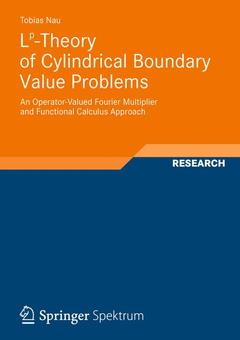Lp-Theory of Cylindrical Boundary Value Problems, 2012 An Operator-Valued Fourier Multiplier and Functional Calculus Approach
Auteur : Nau Tobias

Tobias Nau addresses initial boundary value problems in cylindrical space domains with the aid of modern techniques from functional analysis and operator theory. In particular, the author uses concepts from Fourier analysis of functions with values in Banach spaces and the operator-valued functional calculus of sectorial operators. He applies abstract results to concrete problems in cylindrical space domains such as the heat equation subject to numerous boundary conditions and equations arising from fluid dynamics.
Tobias Nau earned his doctorate under the supervision of Prof. Dr. Robert Denk at the Department of Mathematics and Statistics at the University of Konstanz and is presently a member of the Faculty of Mathematics and Economics at the University of Ulm.
Ouvrage de 188 p.
14.8x21 cm



